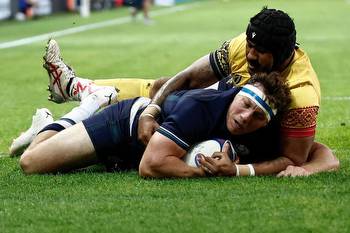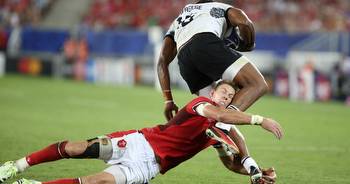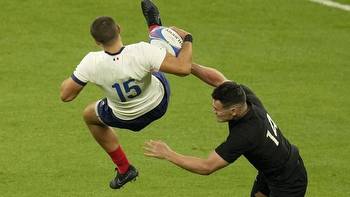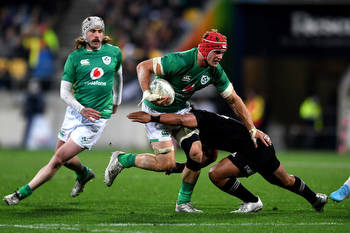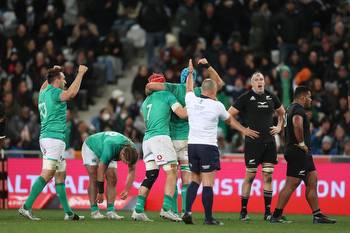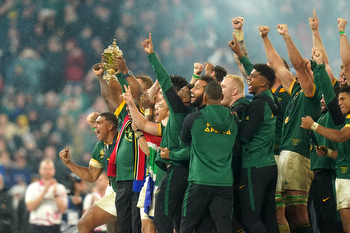Ten Rugby World Cup Takeaways

New Zealand versus South Africa was probably not the final that anyone wanted … except Bokke and Black fans … obviously. Only four nations have ever won the ultimate prize stretching all the way back to the inaugural RWC in 87, in the stone age or, as it’s also known, the amateur era. Only four nations had any realistic chance of winning this tournament. It’s not the fault of the world’s two most successful teams that they remain rooted in perpetuity at the pinnacle of the sport but we had high hopes for hosts France or Ireland to lift silverware, or for Fiji to make a first ever visit to the semi-finals, or even Scotland to rise to the occasion rather than sink without trace. As exciting as the final was, we desperately need some fresh blood challenging at the sharp end or the competition and if this multi-talented French squad could not do it with all the advantages of playing on home soil you have to worry if they ever will? Perhaps playing RWC27 in Australia’s dry summer without the pressure of the home support will actually help Les Blues?
2. The final was decided by a red card, sadly
World Rugby trialed a system whereby a player who was red-carded would leave the field for 20 minutes before being replaced by someone else. What the heck happened to that perfectly good idea? This is not to excuse Sam Cane although it is impossible not to feel a smidgen of sympathy for the Kiwi captain. Players need to understand that to go into a tackle with your head up is inviting disaster. Under the current regulations, Cane’s challenge was a red card all day long and, in what was a one point game, that card surely proved the difference.
Perhaps introduce an orange card for accidental high hits, to distinguish them from blatant foul/cynical play, with a 20 minute sanction?
3. Scotland are not as good as they led us to believe
In the game against South Africa, Scotland showed their competitive chops in the first half but were steamrollered in the second. Against Ireland, for the second successive RWC, the Scots were never at the races, conceding an early score and never seriously threatening the men in green who had the job done by the 60 minute mark when they led 36-0 and had already taken off their key men to protect them ahead of their semi-final. Mack Hansen helped create the opener, earning an ‘assist’ for James Lowe’s try but when did Duhan van der Merwe ever appear on the ‘wrong’ wing for Scotland? Ireland’s second try against Scotland came from a set-piece play so where were Scotland’s brains trust? The Scots were like deer in headlights in the face of the Irish press defence. Scotland’s Gregor Townsend insists on going around it but Ronan O’Gara (in a pre RWC interview with Jim Hamilton) insists you have to go through it. I know which coach I trust. Teams like Ireland are beatable but Townsend failed to inspire his side four years ago and failed again four odd weeks ago. Personally, I abandoned all hope when Ali Price started talking about the power of positive thinking. If nothing else, Townsend should at least have the good sense to stop bigging his team up ahead of key games. Only two coaches stated that they accepted ‘full responsibility’ for their team’s RWC exit, Townsend and Eddie Jones. It is (see 7 below) an utterly hollow and meaningless claim unless followed up by a resignation, which only one of those two coaches has offered. It would be interesting to see how far a world class coach could take Scotland’s “best ever squad”? Perhaps we will find out in Australia?
4. There was only one winner but many teams enjoyed their 15 minutes of fame (hat tip to Squidge Rugby on X)
So France beat New Zealand in that pulsating opening match at the Stade de France and people who were there insist that it was the most manic and magical atmosphere they have ever encountered. New Zealand beat their bogey team Ireland, a victory made all the sweeter after Peter O’Mahony dubbed the Kiwi skipper Sam Cane “a sh#t Richie McCaw”. Cane was obviously outstanding against Ireland. In addition, Ireland enjoyed their moment by beating the eventual champions and confirming in doing so that leaving Handrè Pollard at home was a howler. Wales beat Australia and Fiji. Fiji beat the Wallabies for the first time in 69 years, the Wallabies beat …nah, only joking. The Wallabies failed to beat anyone of any consequence, unless you count the 34-14 victory over Portugal. Portugal beat Fiji and drew with Georgia with huge kudos going to French coach Patrice Lagisquet. Samoa came within a point of beating England and Borthwick’s bunch finished third overall ffs! I reckon just six RWC teams earned little or no consolation prize: Italy, Australia, Namibia, Romania, Georgia and, sorry to say, Scotland, unless you count the 84-0 win over Romania.
5. England grew as the tournament progressed
You wouldn’t open the curtains if England were playing a Test in your back garden but they took full advantage of a soft pool and a kind draw to stay in France far longer than anyone inside or outside the camp suspected. The 14 man win against Argentina was genuinely impressive as was the strong showing against South Africa in that semi-final. You knew Rassie was taking the threat seriously as Handre Pollard was whistled off the bench after just 30 minutes. Goodness only knows what that will do to the confidence of Mannie Libbock but he will presumably spend a little longer on his extras after training. Several players stood up and stood out for England including Ben Earl and, in the final game, Sam Underhill, both of whom you suspect will be starting in white when England faces Italy on 3rd February. England’s problem is that their game is built on the set-piece foundations, especially the scrum. But they lost to South Africa because their second choice props Kyle Sinckler and Ellis Genge were unable to provide the scrum stability provided by veterans Dan Cole and Joe Marler who have now retired from Test rugby. You cannot compete at the top level without world class props.
6. The Americas could host an interesting and competitive Six Nations of their own
The performances of Argentina, Chile and Uruguay were hugely encouraging for rugby in South America even if the northern half of that continent failed to qualify for France 2o23. This is important. Rugby’s footprint on the world is miniscule with next to no representation across vast swathes of the globe: China, India, Indonesia, Africa (Southern Africa excepted), Germany, the whole of Scandinavia, much of Eastern Europe (Georgia/Romania excepted) and the Middle East. Two thirds of the planet haven’t even heard of the game let alone give any hoots about it. This is dreadful for a game that pretends to be worldwide and you have to wonder why World Rugby are so poor at spreading the gospel? There was a Pan American tournament (PARA) that took place sporadically between 1995-2003 that could be resuscitated. At least a Pan-American tournament, the nations operate on similar time zones, could grow into something interesting and may awaken the so-called ‘sleeping giant’ that is the USA. Absolutely nothing else has worked to date.
7. The TMO should shut his (or her) yap
One referee I know commented that the current system is undermining the man with the whistle rather than supporting him. The constant chirping from the man/woman in the booth (in Paris) who wants to look at a knock on from fifteen phases back ruined more than one match. If the three match officials between them miss a knock on in the build up to a try then too bad. Match officials make mistakes, deal with it. The TMO should only be used for foul play and for the grounding of tries where multiple replays can prove useful. Otherwise sit back and pipe down. Please.
8. Sooner or later Eddie Jones will throw you under the bus
The gobby Aussie coach didn’t leave a great many friends in England after several years of under-performance which he laughably pinned on the public school system. Fast forward to RWC’23 and Jones brought a hugely inexperienced Australian squad to France, personified by 22-year-old Carter Gordon. Not only did Jones pick just the one specialist fly-half in his squad, which was madness, but he picked one who had just a handful of caps to his name and was not noticeably proficient off the tee. The Wallabies duly endured their worst ever RWC, exiting at the group stage, while Gordon was replaced at 10 by Ben Donaldson, a specialist full-back and kicker. The Aussies lost to Fiji for the first time in 69 years before imploding against a somewhat ordinary Welsh team who chalked up 40 points while keeping their line intact against a nation that has produced finishers like David Campese and Drew Mitchell. The latter roasted Jones when the coach had the brass neck to state: “It’s my fault, I take full responsibility” for the Welsh fiasco. “What the f#ck does that even mean,” raged Mitchell, “He (Jones) doesn’t get dropped this week”. Worse was to follow as Jones explained that he had overlooked Michael Hooper, Australia’s sometime skipper and their best player of the last decade by a margin, because he “didn’t have the right character”. Hooper declined to bite back, stating instead that “everyone’s entitled to their own opinion”, which shows the sort of class that Jones can’t even imagine. Jones resigned from the Wallabies job just days after insisting he was committed to the project. Goodness knows how much he pocketed for doing so? Is any nation out there stupid enough to offer the clown another performance? Almost certainly.
9. There are far too many substitutions in the game
A full eight substitutes favours the bigger nations with more strength in depth and penalises the smaller nations who may have no more than a handful of competitive players to call upon at international level. But it is horribly difficult to find a way back towards the old ways of asking/expecting 15 players to play 80 minutes. Perhaps only allowing players to be replaced if an independent doctor verifies the injury and always takes exactly five minutes doing so, during which time the side who requires the substitution has to play short-handed? This would discourage players from abusing the system with a sudden hamstring pull but still encourage genuinely injured players to be replaced as playing five shorthanded minutes is a better option than having a right winger with a broken leg. Playing for 80 minutes was always part of the game and it should be that way again. This law change would dismantle the Bokke bomb squad, which got South Africa out of jail against England and, in the process, gave us a far better final.
10. Drop goals are back, kinda
Drop goals are a little like flared jeans, they go in and out of fashion as the generations come and go. When you are an oldie like me who can remember Jannie de Beer’s five against England in the RWC’99 quarter-final it is somewhat comforting to see the likes of George Ford remind everyone that an easy three is just a swing of the boot away. Not everyone jumped on the bandwagon. There were just eight drop goals in all throughout RWC’23 of which five went to England. The other three were claimed by Japan, Uruguay and Wales …. but you knew that already.


